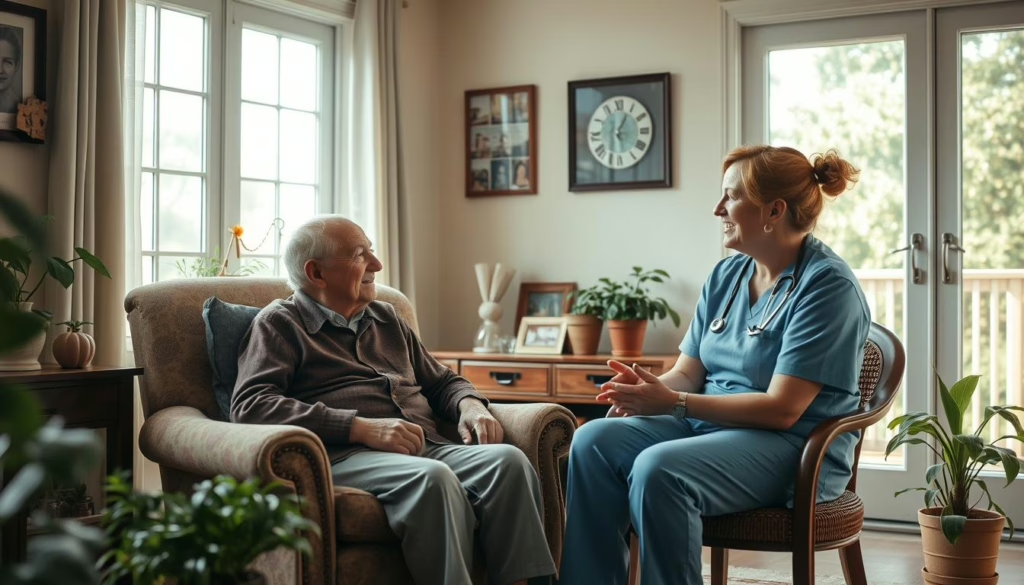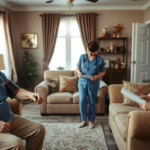The number of older adults is growing fast. This means more people need elderly home care services. Over 40% of those aged 65 and up need help with daily tasks.
Hudson Senior Healthcare is a top choice for senior home assistance. They offer full-service, personalized care for seniors who want to stay at home. Their team provides companionship, helps with medication, and assists with daily tasks. This ensures seniors can live independently with the care they need.
Choosing Hudson Senior Healthcare means your loved ones get top-notch, caring care. For more details, call (469) 893-0806 or visit HudsonSeniorhealthcare.com.
Key Takeaways
- Personalized support is crucial for seniors to maintain their independence.
- Hudson Senior Healthcare offers comprehensive care services tailored to individual needs.
- Their services include companionship, medication management, and daily task assistance.
- Families can rely on Hudson Senior Healthcare for high-quality, compassionate care.
- Contact Hudson Senior Healthcare at (469) 893-0806 or HudsonSeniorhealthcare.com for more information.
Understanding Elderly Home Care Services
Elderly home care services offer personalized support for seniors to stay safe at home. These services meet each person’s unique needs, helping them stay independent.
What Are Elderly Home Care Services?
Elderly home care includes personal care, household chores, and companionship. Trained caregivers provide compassionate care to seniors.
These services help seniors live well in their own homes. They assist with daily tasks, allowing seniors to stay independent.
Importance of In-Home Support
In-home support is key for seniors wanting to stay at home. It helps with daily tasks, health management, and community connection. In-home senior care is customized for each senior’s needs.
Receiving care at home reduces stress and discomfort from moving to a care facility. It also lets family members be part of the care process, creating a supportive environment.
How Services Are Tailored to Individual Needs
Elderly home care services are very personalized. Care providers create a care plan based on each senior’s needs. This plan includes services like bathing, dressing, and transportation.
For example, Comfort Keepers offers care, transportation, and support for seniors to live safely at home. They work with families to understand the needs and preferences of their loved ones, ensuring care is both effective and comforting.
By tailoring services to individual needs, elderly home care providers improve seniors’ quality of life. This approach supports seniors’ physical, emotional, and social well-being.
Types of Elderly Home Care Services
It’s important for families to know about the different elderly home care services. These services help seniors live safely and happily in their own homes. They offer a range of care options to meet the unique needs of each senior.
Personal Care Services
Personal care services are key for seniors. They help with daily tasks like bathing, dressing, and taking medicine. Each client gets care that fits their specific needs.
Key aspects of personal care services include:
- Assistance with personal hygiene and grooming
- Help with dressing and undressing
- Support with mobility and transferring
- Medication reminders and management
Companion Care
Companion care is vital for seniors. It offers them someone to talk to and emotional support. This care helps fight loneliness and keeps their minds and hearts healthy.
Companion care services may include:
- Engaging in conversation and activities with the client
- Assisting with light housekeeping and meal preparation
- Accompanying clients on outings and appointments
- Providing emotional support and companionship
Skilled Nursing Services
Skilled nursing services are for seniors needing medical care. These services are given by licensed professionals. They include wound care, physical therapy, and managing chronic conditions.
| Service | Description | Benefit |
|---|---|---|
| Wound Care | Professional care for wounds, including dressing and infection control | Promotes healing and prevents infection |
| Physical Therapy | Rehabilitation services to improve mobility and strength | Enhances recovery and independence |
| Chronic Condition Management | Ongoing care for conditions such as diabetes and heart disease | Helps manage symptoms and prevent complications |
Knowing about the different elderly home care services helps families make the best choices. This ensures their loved ones receive the care they need to live well.
Benefits of Elderly Home Care
Elderly home care has many benefits. It improves the lives of seniors and their families. It lets seniors stay in their homes and live comfortably.
Promoting Independence
Elderly home care helps seniors stay independent. Caregivers assist with daily tasks like bathing and dressing. This way, seniors can keep living in their own homes.
Dementia care at home is tailored to each person’s needs. It ensures they get the right care and support.
Enhancing Quality of Life
Home care makes seniors’ lives better. It offers companionship and emotional support. Caregivers also help with daily activities.
They engage seniors in conversations and hobbies. This helps fight loneliness and isolation. Respite care for the elderly gives family caregivers a break. It lets them recharge while knowing their loved ones are cared for.
Family Peace of Mind
Home care also gives families peace of mind. They know their loved ones are getting professional care. Families can stay updated on their loved one’s care plan.
The Eldercare Locator is a great resource. It helps families find local care and transportation services.
In conclusion, elderly home care has many benefits. It promotes independence, enhances quality of life, and gives families peace of mind. By choosing the right home care, families can ensure their loved ones thrive.
Key Features of Quality Home Care
Quality home care for seniors includes key elements. These ensure seniors get the best support. At the center are caregivers who are both trained and truly care for their clients.
Trained and Compassionate Caregivers
Caregivers are crucial in delivering top-notch home care. Places like Comfort Keepers stress the value of real, caring relationships. Their caregivers are trained to create care plans that grow with the senior’s needs.
Comfort Keepers’ caregivers are a great example of professionals who bring both skill and empathy. They focus on each client’s unique needs, offering personalized care that improves seniors’ lives.
Customized Care Plans
Every senior is different, and care plans should reflect that. Custom care plans are vital for meeting each senior’s unique needs and preferences. These plans are flexible, changing as the senior’s needs evolve.
“Custom care plans that evolve with a senior’s needs are crucial for delivering effective home care.”
This method ensures seniors get the right care at the right time. It helps them stay independent and healthy.
Safety and Health Monitoring
Keeping seniors safe and healthy is a top priority in quality home care. Caregivers are trained to watch over seniors, spotting risks and preventing them. They help with medication, prevent falls, and make sure homes are safe.
By focusing on safety and health, home care services lower the risk of accidents and health issues. This brings peace of mind to seniors and their families.
Choosing the Right Home Care Agency
Finding the right home care agency is key for families looking for senior home assistance. With many choices, it’s important to look closely at each option. This ensures they can meet your loved one’s needs.
Factors to Consider When Selecting a Provider
When picking a home care agency, several things matter. Think about these:
- The services they offer, like personal care, companion care, and skilled nursing.
- The qualifications and experience of their caregivers.
- The agency’s reputation and what other families say about them.
- If they can create care plans that fit your loved one’s specific needs.
It’s also important to see if they can provide aging in place care. This means your loved one can stay safely at home.
Questions to Ask Potential Agencies
It’s important to ask the right questions. Here are some key ones:
- How do they match caregivers with clients?
- How do they handle emergencies or changes in care needs?
- Can they give references or testimonials from other families?
- How do they train and support their caregivers?
Understanding Pricing and Payment Options
It’s crucial to understand the costs of home care services. Agencies have different pricing and payment options. Make sure to:
- Get clear on the costs of the services you need.
- Ask about any extra fees or charges.
- Look into payment options, like insurance and financial help programs.
By carefully looking at these factors, you can make a good choice. This way, you can find a home care agency that offers top-notch senior home assistance.
The Role of Family in Home Care
In-home senior care is a team effort. Professional caregivers and family members work together. Family members support their loved ones and make sure the care fits their needs.
Communicating with Care Providers
Good communication is key. Family members should tell care providers about their loved one’s likes, health changes, and any worries. This helps avoid misunderstandings and ensures the care meets family expectations.
Tips for Effective Communication:
- Schedule regular meetings with care providers to discuss the care plan.
- Keep a log of important events, such as medication changes or health issues.
- Be open about your concerns and expectations.
Involving Family in Care Decisions
Family involvement in care decisions is important. It ensures the care matches the senior’s wishes and needs. Family members can share their knowledge of the senior’s preferences and values. This helps make decisions that respect the senior’s autonomy.
The benefits of family involvement include:
- More personalized care that reflects the senior’s lifestyle and preferences.
- Improved trust between family members and care providers.
- Better support for the senior’s physical and emotional needs.

Support Systems for Caregivers
Caregiving can be tough, both physically and emotionally. It’s crucial for family caregivers to have support. Support groups, respite care, and counseling services can offer relief and guidance.
Resources for Family Caregivers:
- Local support groups for sharing experiences and advice.
- Respite care services to provide temporary relief.
- Counseling services to address emotional and psychological challenges.
By working together, family members and care providers can create a supportive environment. This enhances the quality of life for seniors receiving in-home care.
Technology in Elderly Home Care
Technology is playing a big role in elderly home care. It helps provide better, more personal care. As more seniors live at home, new tech solutions are needed to keep them safe and healthy.
Telehealth Services
Telehealth services are a big step forward in elderly care. They let seniors talk to doctors from home. This cuts down on hospital visits and makes medical care easier to get.
Telehealth includes video chats, tracking health from afar, and keeping electronic health records. These features help care be more organized and effective.
Monitoring Devices
Monitoring devices are key in elderly care tech. They include emergency alert systems, health trackers, and home security. These tools make seniors safer and more comfortable at home.
For example, emergency alert systems let seniors call for help easily. This gives them and their families peace of mind.
Benefits of Technology for Seniors
Technology in elderly care has many benefits. It makes seniors safer, healthier, and more independent. It also helps with personal care for seniors and dementia care at home.
Some main advantages of tech in elderly care are:
- More access to healthcare through telehealth
- Improved safety with monitoring and alert systems
- Healthier outcomes thanks to timely care and monitoring
- Seniors can stay in their homes longer, feeling more independent
By using technology, elderly care can become more tailored, efficient, and effective. This improves the lives of seniors greatly.
Legal and Ethical Considerations
Understanding the legal and ethical sides of elderly home care is key. As the number of elderly grows, following these standards is more important than ever.
Understanding Patient Rights
Patient rights are at the heart of ethical home care. These rights include informed consent, privacy, and being treated with respect. Knowing these rights helps caregivers and families ensure the elderly get the care and dignity they deserve.
The right to informed consent means the elderly must know their care plan. This includes any risks or benefits. This openness builds trust among patients, their families, and caregivers.
Consent and Confidentiality
Consent and keeping information private are key in elderly home care. Getting consent before care or sharing personal info is both legal and ethical. Keeping information private is vital for trust with elderly clients.
Caregivers need training to handle sensitive info carefully. They must not share personal details without permission. This includes being careful with digital records and keeping them safe.
Regulatory Standards for Care
Regulations for elderly home care differ by state but cover key areas. Following these rules is a must for home care agencies to be legal and ethical.
| Regulatory Aspect | Description | Importance |
|---|---|---|
| Caregiver Qualifications | Training and background checks for caregivers | Ensures competent care |
| Care Planning | Personalized plans addressing the needs of the elderly | Tailors care to individual needs |
| Health and Safety Protocols | Guidelines to prevent accidents and ensure a safe environment | Protects the well-being of the elderly |
Medicaid and other programs may cover some home care services. But, it’s important to know patient rights and regulations to use these options well.
By following these legal and ethical guidelines, families and caregivers can provide top-notch, respectful care. This care supports the independence and well-being of the elderly.
How to Transition to Home Care
Transitioning to home care requires several steps. First, you need to prepare the home and assess the senior’s needs. This ensures that seniors get the support they need while keeping their independence.
Preparing the Home Environment
Preparing the home is key when moving to elderly home care services. You need to make changes to make the home safe and easy to get around.
- Remove tripping hazards such as rugs and clutter.
- Install handrails in places like bathrooms and stairways.
- Improve lighting to make it easier to see.
These changes help prevent falls and injuries. They make the home safer for seniors.
Initial Assessment and Planning
An initial assessment is crucial to understand the senior’s needs. It covers medical history, daily activities, and social needs. This helps create a care plan that fits the senior’s life.
| Assessment Area | Description | Care Plan Implications |
|---|---|---|
| Medical History | Review of past and current medical conditions. | Informing medication management and health monitoring. |
| Daily Living Activities | Assessment of ability to perform tasks like bathing, dressing, and eating. | Determining the level of assistance required. |
| Social Needs | Evaluation of social interactions and support systems. | Arranging for companionship and community engagement. |
This detailed assessment helps caregivers tailor their services. It makes senior home assistance more effective.
Building Trust with Caregivers
Building trust between seniors and caregivers is essential. This can be done by having consistent caregivers, encouraging open communication, and respecting the senior’s wishes and routines.
Consistency in caregivers makes seniors feel more at ease. They get to know their caregivers over time.

By following these steps and focusing on each senior’s unique needs, families can make the transition to home care smooth. This improves the quality of life for their loved ones.
Stories of Success
Seniors who have received in-home care share inspiring stories. These tales show the value of caring support. They highlight how home care improves life for the elderly.
Real-Life Benefits of Home Care Services
Home care lets seniors stay in their homes with dignity. Programs like Senior TLC include family in care and offer top-notch service. This leads to better health and happiness for seniors.
“The care for my mother was outstanding,” a family member said. “The caregivers were professional and caring.” Many families agree, seeing the positive change in their loved ones.
Testimonials from Families
Families who choose in-home care share their positive experiences. “Our father quickly adjusted to having caregivers,” they say. This shows how home care can improve health.
Choosing the right home care agency is key. Look for quality caregivers, detailed care plans, and flexibility to meet the senior’s needs.
Case Studies Demonstrating Impact
Case studies show the big impact of home care on seniors. For example, the PACE program improved health, reduced hospital stays, and boosted quality of life.
Personalized care is the secret to success. Tailoring care to each senior’s needs makes a big difference. As a caregiver said, “It’s about improving someone’s life, not just providing care.”
“The inclusion of family members in the care process and the quality of care provided have been the most significant benefits of the Senior TLC program.”
In conclusion, home care success stories prove the power of caring, personalized support. By focusing on each senior’s needs, home care agencies can greatly improve their lives and those of their families.
Future Trends in Elderly Home Care
The world of elderly home care is set for a big change. New tech and a need for more personal care are leading the way. Elderly companion services and personal care for seniors will be key in this shift.
Innovations on the Horizon
Technology is set to change home care a lot. Telehealth services let seniors get medical help at home. Also, devices track health and prevent falls, making homes safer.
Artificial intelligence (AI) is being looked at for its care benefits. AI companions help with daily tasks, offer friendship, and even play games to keep minds sharp.
Changes in Regulatory Framework
As home care for the elderly grows, rules are changing too. New regulations aim to protect seniors and keep them safe. These rules cover training, background checks, and tech use in care.
Following these rules helps care providers give top-notch care. It ensures seniors get the best care possible.
The Shift Toward More Personalized Care
Personal care is becoming a big focus in elderly home care. Providers are moving from a one-size-fits-all approach to custom care. This means customized care plans that meet each senior’s unique needs.
| Trend | Description | Benefit |
|---|---|---|
| Telehealth Services | Remote medical consultations | Increased access to healthcare |
| Monitoring Devices | Tracking vital signs and detecting falls | Enhanced safety and security |
| AI-Powered Companions | Assistance with daily tasks and companionship | Improved quality of life |
By adopting these trends, the elderly home care industry can offer better, more caring, and tailored care. This will improve seniors’ lives and help them stay independent.
Resources for Families Seeking Home Care
Families looking for home care for their loved ones need help. There are many resources to guide them through the complex world of elderly care. These resources help families make good choices.
National Organizations and Support Groups
The Eldercare Locator is a great resource for families. It offers support and information on care options. This includes dementia care at home, respite care, and skilled nursing for seniors.
Finding Local Services
To find local care services, families can use online directories. They can also contact local Area Agencies on Aging. These tools help families find trusted providers in their area.
Educational Materials
There are educational materials on aging and care options. These materials keep families updated on the latest in elderly care. They help families make informed decisions for their loved ones.




